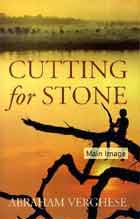
Marion suffers a series of painful betrayals-by his father, by Shiva, and by Genet.

How does Verghese use medical detail to create tension and surprise? What do his depictions of dramatic surgeries share with film and television hospital dramas-and yet how are they different? There are a number of dramatic scenes on operating tables in Cutting for Stone: the twins' births, Thomas Stone amputating his own finger, Ghosh untwisting Colonel Mebratu's volvulus, the liver transplant, etc. In the novel, Thomas Stone asks, "What treatment in an emergency is administered by ear?"" The correct answer is "Words of comfort." How does this moment encapsulate the book's surprising take on medicine? Have your experiences with doctors and hospitals held this to be true? Why or why not? What does Cutting for Stone tell us about the roles of compassion, faith, and hope in medicine? What other important differences does Cutting for Stone reveal about the way illness is viewed and treated in Ethiopia and in the United States? To what extent are these differences reflected in the split between poor hospitals, like the one in the Bronx where Marion works, and rich hospitals like the one in Boston where his father works? Why? Marion observes that in Ethiopia, patients assume that all illnesses are fatal and that death is expected, but in America, news of having a fatal illness "always seemed to come as a surprise, as if we took it for granted that we were immortal" (p. What draws each of them to the practice of medicine? How are they affected, emotionally and otherwise, by the work they do?

What does Cutting for Stone reveal about the emotional lives of doctors? Contrast the attitudes of Hema, Ghosh, Marion, Shiva, and Thomas Stone toward their work. It is one of the best books I've read in a long timeĪbraham Verghese has said that his ambition in writing Cutting for Stone was to "tell a great story, an old-fashioned, truth-telling story." In what ways is Cutting for Stone an old-fashioned story and what does it share with the great novels of the nineteenth century? What essential human truths does it convey? Beautifully written with detail and precision, you will miss it when it ends. It's filled with love politics, culture, family, tragedy, betrayal and much more! It reminded me of the book Poisonwood by Barbara Kingsglover. The story begins with the birth of the narrator.Īs you follow his life you will fall in live with his story and come to feel as if you know the characters personally. PBR Book Review: (by- Andrea) At 500 pages it certainly is a long book, but worth every second, earning five stars rating from this reader! Cutting For Stone is a sweeping family saga which draws you in and transports you to a small missionary hospital in Ethiopia.


 0 kommentar(er)
0 kommentar(er)
